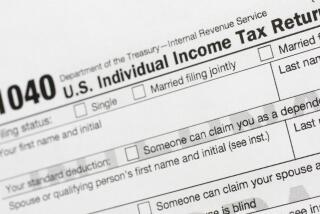$16 Billion Found in Dubious Deductions
- Share via
The government’s effort to encourage taxpayers who use questionable tax shelters to come forward has uncovered $16 billion in dubious deductions, as well as information about people who promote the abusive shelters, IRS officials said Thursday.
The IRS, which launched the four-month tax shelter disclosure program in December, said 577 individual and corporate taxpayers had come forward. The claimed losses and deductions in these disclosures totaled $16 billion--an amount that probably would result in an assessment of $5.6 billion in tax.
But that may understate the impact of the program, said IRS spokesman Ken Hubinak. The $16-billion figure excludes shelters that were disclosed without deduction or loss figures estimated by the taxpayer, he said. When those are tallied, the total probably will soar.
The disclosure program, which ran from late December to last week, waives underpayment penalties that can boost tax assessments by as much as 20%.
Taxpayers, in turn, were required to voluntarily turn over documents related to the shelters they used and provide information about the promoters who sold them.
“We have agreed to work with these taxpayers to resolve their concerns as quickly and efficiently as possible,” said Larry Langdon, IRS commissioner of large and mid-size business. “At the same time, we are beginning to go after the tax shelter promoters identified in these documents.”
Once those leads are followed, the agency may uncover billions more in unpaid taxes, experts said.
“They are trying to identify promoters, because once you get the promoter, you can subpoena their client list,” said Wayne McEwan, an investigative consultant who previously ran the IRS’ criminal investigation division in L.A.
Not all tax shelters are illegal. But the government loses billions of dollars in revenue a year because of complex, questionable tax avoidance schemes aggressively marketed by accounting and law firms to companies and wealthy people.
The agency recently has won several battles in its war on tax shelters--including getting credit card companies to disclose information about owners of offshore accounts--that are nearly certain to result in future criminal and civil tax cases and possibly deter future cheating.
The penalty waiver program was meant to bolster an existing IRS registration program for tax shelters. It was aimed at taxpayers who were worried that their arrangements might be illegal but were afraid to come forward.
*
Associated Press was used in compiling this report.
More to Read
Sign up for Essential California
The most important California stories and recommendations in your inbox every morning.
You may occasionally receive promotional content from the Los Angeles Times.













